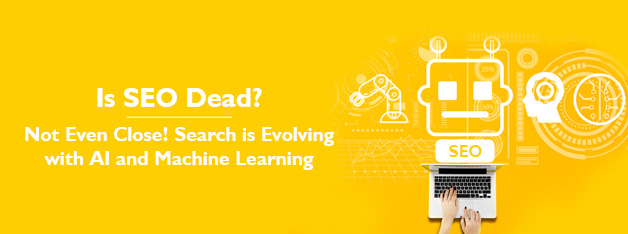Is SEO Dead? Not Even Close! Search is Evolving with AI and Machine Learning

RIP “SEO is Dead” rumours.
Google processes 8.5 billion searches daily; that’s 99,000 searches per second. Do you still think SEO can be dead? People are continuously finding information, research products, and learn new things. But the Search engines are constantly evolving, and the way users interact with them is changing too. Earlier Google used to serve a list of webpages, but now search engine ranking page landscape has become more interactive and it evolved to offer a more dynamic and more user-centric experience than ever.
Forget the SEO funeral! SEO has become more advanced, answering queries like never before.
The Evolution of Organic Results: From Keywords to Conversations
Google’s search landscape has significantly changed a lot over the 5 years. Gone the days of simple keyword searches! Today, integration of AI (Artificial Intelligence) & ML (Machine Learning) has helped Google to evolved as most powerful search engine for the users. It displays results that are tailored than ever before.
Google’s search results have become more useful by the introduction of featured snippets.
Below are four types of featured snippets:
- Paragraph Snippets: Paragraph-formatted answer to a query
- List Snippets: Listicle format to provide detailed result for queries such as “best smartphones”
- Table Snippets: Presenting information in an organized format
- Video Snippets: Engaging & relevant video clips directly answering the query
An Ahref study of 2 million featured snippets showed:
- 12.3% of search queries have a featured snippet
- 8.6% of clicks go to featured snippets
- 30.9% of featured snippets rank in position one
Featured snippets comes with pros and cons. On one hand, they enhance the visibility and on the other hand, they can impact negatively the number of clicks to websites. This has led to the rise of “zero-click searches”, where users find their answers right in the search results rather than clicking a website.
Instead of saying SEO is dead, we should understand how SEO has changed and what people are looking from the search.
For example, if someone searches “best camera phone,” they expect to find different brands comparisons or reviews of the buyers to purchase the right camera. An article about the history of camera wouldn’t be a good match.
Is Google’s Search Generative Experience (SGE) Going to Kill SEO?
The answer is “No”. Search Generative Experience (SGE) has drastically impacted the Search Engine Result Page (SERP) & organic rankings. This new feature will occupy a top space of Google search results, above the organic search listings.
Google’s new Search Generative Experience (SGE) is set to transform search from a link-based system into a dynamic, conversational experience. Instead of merely listing websites, Google will now offer direct, conversational answers to your questions, making it easier and faster to find what you’re looking for.
Will SGE Replace Traditional SEO?
No, SGE won’t replace traditional SEO, but it will significantly change it. Let’s understand the key difference between SGE vs Traditional SEO:
SGE vs. Traditional SEO
| Key Factor | Traditional SEO | SGE (Search Generative Experience) |
| Primary Focus | Ranking on search engine result pages | Providing direct, conversational answers above organic results |
| User Experience | Clicking on links to visit websites | Getting immediate answers and summaries, hence no need to visit webpages |
| SEO Strategy | Keywords, backlinks, on-page and off-page optimization | Adapting to AI-driven answer generation and content quality |
| Evolution | SEO will evolve to integrate with SGE | SGE introduces new features but relies on ongoing SEO practices |
SGE uses AI to gather information from a variety of online sources like blogs. This new approach demonstrates why it’s crucial for content marketing to stay relevant. If websites stop creating content, Google won’t have the data it needs to show it. While SEO will evolve, it will still play a key role in reaching users on Google’s innovative platform.
The SEO will never be dead, but you should know that it will continuously evolve and use new strategies to work alongside SGE’s direct answer features.
How AI is changing SEO: Unlock the New Search Strategies
The rise of AI & ML is transforming the SEO. Instead of relying solely on keywords, search engines now use AI to provide an exceptional online experience and achieve unique results.
Integration of can be challenging for the marketers but it doesn’t mean that SEO is dead. Instead, it is a time to upgrade your SEO strategies.
Here is a quick summary of how AI is evolving SEO strategies:
| Key Factors | Before AI | After AI |
| Smarter Search Algorithms: Moving Beyond Keywords | Keyword-focused results | AI enables search engines to understand context and user intent, not just keywords |
| Enhanced Content Creation: Generating High-Quality Content | Manual content creation by human and optimization | AI tools assist in creating and optimizing content more efficiently and quickly |
| Predictive Analytics: Anticipating Trends and Behavior | Reactive trend analysis | AI analyzes data to predict trends and understands user behavior |
| Personalization: Tailoring Content to Users | Generic content for all users | AI personalizes search results and content based on user behavior |
| Voice Search Optimization: Adapting to New Search Methods | Text-based queries and results webpages | AI advances voice search, requiring different optimization techniques |
| Chatbots and Virtual Assistants: Enhancing User Engagement | Basic customer service interactions | AI-powered chatbots provide instant support and gather user data |
| AI for Technical SEO: Automating SEO Tasks | Manual site audits and performance tracking | AI tools automate technical SEO tasks like audits and performance tracking |
| AI for Link Building: New Opportunities for Backlinks | Manual link-building efforts | AI tools help find and acquire high-quality backlinks |
| AI for SEO Reporting: Gaining Deeper Insights | Basic performance metrics and reports which are time consuming | AI provides advanced reporting and analysis for SEO performance |
How to Power Your SEO Strategies with the integration of AI?
Although AI offers huge potential and changing the SERP landscape, it’s important to use it strategically. Here’s how you can integrate AI into your SEO strategy and stay in the game:
| AI-Driven Factors | Description | New Strategy |
| Smarter Search Algorithms | AI helps search engines understand user intent and context beyond just keywords. | Focus on what user is looking for and create content on a long tail keyword to answers real questions |
| Enhanced Content Creation | AI tools streamline content creation and optimization processes. | Use AI for content creation and optimization to improve quality and SEO |
| Predictive Analytics | AI analyzes data to forecast trends and user behavior. | Leverage AI insights for future content creation and SEO strategies |
| Personalization | AI customizes search results and content based on user behavior. | Create personalized content and adjust strategies based on user preferences |
| Voice Search Optimization | AI enhances voice search capabilities and techniques. | Optimize for conversational queries and aim for featured snippets in search results |
| Chatbots and Virtual Assistants | AI-driven tools offer immediate support and collect user data. | Implement chatbots for support and use gathered data to refine SEO efforts |
| AI for Technical SEO | AI automates technical SEO tasks like site audits and performance tracking. | Use AI for regular site audits, technical issue detection, and SEO health monitoring |
| AI for Link Building | AI tools assist in finding and acquiring quality backlinks. | Use AI for link analysis and to automate outreach for link building |
| AI for SEO Reporting | AI offers advanced tools for in-depth SEO performance reporting. | Utilize AI-driven tools for detailed SEO reporting and actionable performance insights |
Conclusion: SEO Will Never Die
No matter what people are saying, SEO is still alive and far from dead in 2024, but it is constantly evolving. Today, it has become a more sophisticated and user-centric practice.
Instead of being concerned with unchangeable factors, redirect your efforts towards optimizing your SEO strategies to stay in control. Partnering with the right SEO agency can help you to integrate modern AI techniques into your SEO strategies and achieve substantial organic growth
At BC Web Wise, we integrate AI into our SEO practices to offer innovative solutions that help businesses achieve sustainable organic results.
